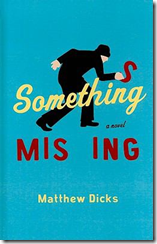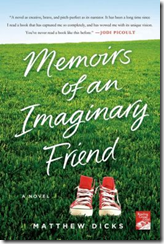Matthew Dicks's Blog, page 441
October 5, 2013
Out of the frying pan…
…and into bigoted stupidity.
The smirk on the guy’s face after suggesting that homosexuality is akin to incest is just appalling.
History (and blogger) repeats itself
So yesterday I wrote my sixteenth Unfair Assumption post, questioning the intelligence of people who choose to begin smoking today.
It turns out that I wrote nearly the same post almost exactly one year ago as my second Unfair Assumption post.
Perhaps it’s time to quit blogging.
The boy is trouble.
My son is unlike my daughter in many ways.
Most noticeably is the likelihood that he will get himself into a sticky situation or find his way into trouble. When my daughter was his age, our home was free of child-proof locks, gates or child-proofing of any kind. She was a careful, thoughtful, child who obeyed our every command.
We told her to stay away from the stairs, so she never went anywhere near the stairs. It was that simple.
Charlie can’t walk yet, but he has ascended the stairs twice already while our backs were turned.
Clara also learned from her mistakes and rarely repeated them. When she was two years-old, she fell out of her crib and hit her head on the floor. The pediatrician said we couldn’t risk another fall like that and needed to transition her into a bed immediately. We ignored the doctor’s orders and kept her in the crib, and she stayed there for another 18 months without incident until her brother was born.
Clara doesn’t make mistakes like that twice.
Our newest bundle of joy is an entirely different story. He continues to attempt to fling himself off our bed despite the number of times he has already fallen. He is a daredevil. Fearless.
There is hope. While he chases the cat constantly, pulling his tail and smothering him with hugs, he has learned to steer clear of the dog, who is much less tolerant of tail pulls and eye pokes. But it’s still not uncommon for me to walk into a room and find him in a position like one of these with a devilish look in his eyes.
I have a sneaking suspicion that he is going to give us a run for our money.
October 4, 2013
Resolution update: September
In an effort to hold myself accountable, I post the progress of my yearly goals at the end of each month on this blog.
The following are the results through September.
1. Don’t die.
Still good.
2. Lose ten pounds.
Still down ten pounds for the year, though I went up three pounds after a trip to Camp Jewell with my students. I like the oatmeal a lot. It took a couple days, but I managed to get back down to my pre-trip weight.
I’m attempting to lose another ten pounds during the second half of 2013 but have not made any progress on this secondary goal yet.
3. Do at least 100 push-ups and 100 sit-ups five days a day. Also complete at least two two-minute planks five days per week.
I missed three days in September due to our trip to Camp Jewell and illness.
4. Launch at least one podcast.
We have a producer. We have a format. The equipment is in place. This is actually going to happen. Soon.
5. Practice the flute for at least an hour a week.
I can’t find my flute. I don’t know what to do.
6. Complete my fifth novel before the Ides of March.
7. Complete my sixth novel.
The first 40,000 words of my sixth novel are in the hands of my agent while I work feverishly on the revisions of my fifth novel. I am still on target to actually finish the manuscript by the end of the year.
8. Sell one children’s book to a publisher.
I will send at least one of the manuscripts to my agent by the end of October, which I also said last month and the month before that and the month before that.
On a positive note, I have three new children’s book ideas that I love.
9. Complete a book proposal for my memoir.
My golf memoir is in the hands of my agent.
The first two chapters of my originally planned memoir are written. I still plan on completing this proposal by the end of the year as well.
10. Complete at least twelve blog posts on my brother and sister blog.
No posts published in September. We remain one post away from reaching our goal.
11. Become certified to teach high school English by completing two required classes.
I remain one class and an inexplicable $50 away from achieving certification. Since I have no intention of leaving my elementary school within the next two years, this goal has taken a bit of a backseat to others. I may not complete the final course in 2013 depending on when it is offered.
12. Publish at least one Op-Ed in a newspaper.
I have published three pieces in the Huffington Post and one in Beyond the Margins. Last week I submitted an Op-Ed to the Hartford Courant. I am awaiting a response.
13. Attend at least eight Moth events with the intention of telling a story.
I competed in one Moth StorySLAM in September, bringing my total Moth events in 2013 to fifteen. I placed first, running my consecutive winning streak to five.
14. Locate a playhouse to serve as the next venue for The Clowns.
The script, the score and the soundtrack remain in the hands of a New York City playhouse. On a side note, there may be interest in our next show, which isn’t actually written yet.
15. Give yoga an honest try.
No progress.
16. Meditate for at least five minutes every day.
I missed eight days in September because of days when my son awoke before I had a chance to meditate and days spent at camp.
17. De-clutter the garage.
I have been told that the remaining furniture will be removed soon.
18. De-clutter the basement.
Work continues, albeit at a glacial pace.
19. De-clutter the shed
Work ceased on this project in August. I’d love to think that it will begin again in September, but with the month ahead, that is hard to imagine.
20. Reduce the amount of soda I am drinking by 50%.
After recording my first glass of soda for September, I failed to record another. And now we’re four days into October, so this month is lost, too.
21. Try at least one new dish per month, even if it contains ingredients that I wouldn’t normally consider palatable.
I tried a vegetable soup that included broccoli and regretted it.
22. Conduct the ninth No-Longer-Annual A-Mattzing Race in 2013.
No progress.
23. Post my progress in terms of these resolutions on this blog on the first day of every month.
Four days late.
Unfair assumption # 16: There is something seriously wrong with the intellect and/or self esteem of anyone who chooses to begin smoking today.
There is something seriously wrong with the intellect and/or self esteem of anyone who chooses to begin smoking today.
Call me naïve, but I have never understood why anyone chooses to begin smoking anymore. The documented health risks, the social stigma, the high cost of cigarettes and the negative impact on one’s physical appearance all make the decision to begin smoking inexplicable to me.
I understand why my mother smoked. Her generation didn’t know any better. When she was born, well over half of Americans smoked, and warning labels did not appear until 1966. But even when I was growing up in the 1980s, it was abundantly clear that cigarettes killed people and the number of smokers in the world was rapidly declining.
Today about 17% of Americans smoke, down from 25% when I was a teenager. Since a nonsmoker is considerably less likely to date a smoker, the reduction in the dating pool alone should deter young people from smoking.
Yet every year, middle and high school students begin smoking.
Like I said, there has to be something wrong with these kids.
Right?
Either you lack the intellect required to understand simple cause and effect relationships or you lack the self esteem required to stand up to peers who lack the intellect to understand simple cause and effect relationships.
I can’t think of any other explanation. Either you’re an idiot or you’re powerless to the influence of idiots.
In the midst of writing this post, I found myself wondering if this unfair assumption has ever been tested.
Do smokers have lower IQ scores than nonsmokers? Are smokers dumber than nonsmokers.
It turns out that they are. Many studies have been done on the subject, and again and again, the findings have indicated that smokers tend to have lower IQ scores than nonsmokers. In addition, research shows that the more you smoke, the lower your IQ score.
It turns out that my unfair assumption isn’t so unfair after all. Smokers are dumber than nonsmokers.
The New York Times recently reported that the share of middle and high school students who are using e-cigarettes doubled in 2012 from the previous year. While e-cigarettes are presumably safer than traditional cigarettes, there is little research on the subject, and the dangers of nicotine addiction remain.
Not to mention you are forced to walk around with a plastic stick hanging out of your mouth.
There is no existing research on the IQ levels of people who smoke using e-cigarettes, but I think it’s safe (but perhaps unfair) to assume that a person who thinks it’s a good idea to stick a plastic, nicotine dispensing device into one’s mouth on a regular basis is probably not as smart as the one who chooses not to.
Call it a hunch.
Unfair assumption # 16
There is something seriously wrong with the intellect and/or self esteem of anyone who chooses to begin smoking today.
Call me naïve, but I have never understood why anyone chooses to begin smoking anymore. The documented health risks, the social stigma, the high cost of cigarettes and the negative impact on one’s physical appearance all make the decision to begin smoking inexplicable to me.
I understand why my mother smoked. Her generation didn’t know any better. When she was born, well over half of Americans smoked, and warning labels did not appear until 1966. But even when I was growing up in the 1980s, it was abundantly clear that cigarettes killed people and the number of smokers in the world was rapidly declining.
Today about 17% of Americans smoke, down from 25% when I was a teenager. Since a nonsmoker is considerably less likely to date a smoker, the reduction in the dating pool alone should deter young people from smoking.
Yet every year, middle and high school students begin smoking.
Like I said, there has to be something wrong with these kids.
Right?
Either you lack the intellect required to understand simple cause and effect relationships or you lack the self esteem required to stand up to peers who lack the intellect to understand simple cause and effect relationships.
I can’t think of any other explanation. Either you’re an idiot or you’re powerless to the influence of idiots.
In the midst of writing this post, I found myself wondering if this unfair assumption has ever been tested.
Do smokers have lower IQ scores than nonsmokers? Are smokers dumber than nonsmokers.
It turns out that they are. Many studies have been done on the subject, and again and again, the findings have indicated that smokers tend to have lower IQ scores than nonsmokers. In addition, research shows that the more you smoke, the lower your IQ score.
It turns out that my unfair assumption isn’t so unfair after all. Smokers are dumber than nonsmokers.
The New York Times recently reported that the share of middle and high school students who are using e-cigarettes doubled in 2012 from the previous year. While e-cigarettes are presumably safer than traditional cigarettes, there is little research on the subject, and the dangers of nicotine addiction remain.
Not to mention you are forced to walk around with a plastic stick hanging out of your mouth.
There is no existing research on the IQ levels of people who smoke using e-cigarettes, but I think it’s safe (but perhaps unfair) to assume that a person who thinks it’s a good idea to stick a plastic, nicotine dispensing device into one’s mouth on a regular basis is probably not as smart as the one who chooses not to.
Call it a hunch.
A simple way of identifying an idiot
A 2012 survey of more than 500 college graduates by Adecco, a human-resources organization, found that 8% of them had a parent accompany them to a job interview, and 3% had the parent sit in on the interview.
I try to avoid broad generalizations whenever possible, but we all agree that any parent or child who does this is an idiot.
Right?
October 3, 2013
The career of an author is not all angst and loneliness. Some of the time.
I am not a starry eyed author. I expect little from my publishing career. When I published my first novel, Something Missing, in 2009, I was not under the illusion that I would be quitting my day job anytime soon. I saw that book as a small, uncertain, precarious step into a new career that came with no guarantees.
With each successive book, my attitude has changed very little. My most recent novel, Memoirs of an Imaginary Friend, has sold well and has been translated into more than 20 languages worldwide, and I still view every book as possibly my last.
There are no guarantees. If I don’t write an excellent book every time, this career could end tomorrow.
This pessimistic attitude means that I am rarely disappointed by my writing career and occasionally surprised and elated about truly unexpected surprises that my writing career brings. This week has been just such a week.
On Monday I made arrangements to Skype with a book club in Saudi Arabia about Memoirs of an Imaginary Friend. Saudi Arabia! The fact that people around the globe are reading my stories never fails to excite me.
On that same day, one of my former students told me that her college roommate was discussing my most recent novel in her English class.
That same night I drove to New York City to compete in a Moth StorySLAM, and I won. My fifth won in a row! I wouldn’t be nearly the storyteller that I am today without my writing career.
On Tuesday I scheduled meetings with two local book clubs to talk about my my books and my writing career.
Yesterday I received updates on the film options on two of my novels. While there are absolutely positively no guarantees when it comes to Hollywood and movie deals, the fact that talented people are working hard to adapt and develop my material is thrilling.
Last night a college student sent me a book trailer for Memoirs of an Imaginary Friend that he created for class.
This has been an unusual week in terms of happy publishing moments. Most of the time, I am sitting at a table, fighting with words, struggling to find a few more minutes in my busy day to write. It’s hard, it’s lonely, it’s frightening and it’s always uncertain.
That said, weeks like this help a lot.
Little biker dude
He can’t pedal yet (or even reach the pedals), but that isn’t stopping him from loving his tricycle.
We may have a future biker on our hands.
October 2, 2013
I want credit for not being a jerk. Is that too much to ask?
I am known amongst my friends for my tendency to take credit (and sometimes demand it) for exercising restraint. A person irritates or annoys me, and rather than firing off the multitude of retorts that quickly pile up in my head, I keep my mouth shut and demand recognition for my willingness to avoid confrontation.
Not surprising, few (actually none) believe that I deserve credit in these instances. I’m told that everyone exercises this kind of restraint, and the only reason that I feel entitled to some credit is because I don’t exercise it often enough.
As a friend once said, “You don’t get credit for not acting like a jerk just because you usually act like a jerk.”
Some friend. Huh?
Along these same lines, a friend recently pointed me to an NPR story on “moral grade inflation,” indicating that these lines in particular made him think of me:
When you celebrate what should be ordinary behavior as extraordinary, experts say, it sends a dangerous message.
“I do worry about a culture in which people are giving selves credit for not having done terrible things. It sets a really low bar for what it takes to be a good person,” says London Business School professor Daniel Effron. Effron, who teaches behavioral ethics, says feting folks for what he calls “the immoral road not taken” could actually encourage bad behavior.
Hogwash, I say, both because it’s nonsense and because the quote comes from a professor at the London Business School, so a word like hogwash feels right.
The desire to say something mean or stupid or do something mean or stupid is a powerful one. It’s what causes people to do wrong. It’s the basis for evil. If people resisted their immoral urges more often, the world would be a much better place. It’s great to imagine a world in which good deeds are the norm and surprising generosity isn’t so surprising, but a world in which everyone resisted the urges to do wrong would be pretty freakin’ great, too.
A low bar? Perhaps. But I would argue it’s a more realistic, less idealized bar, and one we have yet to clear. And if we ever did manage to clear that low bar, the world would change for the better in immeasurable ways.
It’s also harder for some to resist these kinds of urges than others. My first novel is about a fairly benevolent burglar who believes that he might be the best thief who has ever lived (and he might be right). He struggles with the idea of abandoning his life of crime because of his remarkable skill and expertise.
Imagine how difficult it must be to quit doing something when you’re at the top of your game.
This is why I take credit (and often demand it) for exercising restraint. I am extremely adept at verbal combat. Engage me in an argument and my mind works incredibly fast. Options for retorts, insults, counterpoints and more flash through my mind like the Terminator’s visual display. I find myself with a multitude of options, and it’s simply a matter of choosing the one that will do the most damage or hurt my opponent the most.
It’s what I’m good at. It’s my thing. I can’t throw a football or make simple household repairs or understand a word of a Virginia Woolf novels, but I am damn good when it comes to verbal combat. It’s a skill that was probably honed from a childhood of living with an evil step-father who made a living as a psychiatric social worker.
It was a proving ground like no other.
So yes, when I am confronted with a stupid or annoying person, and I exercise restraint when I’m quite capable of eviscerating the person, I want some credit, damn it. I want it acknowledged that I didn’t do bad, and that while not doing bad isn’t the same as doing good, it’s close enough.
For some of us, it’s all we can do.





















